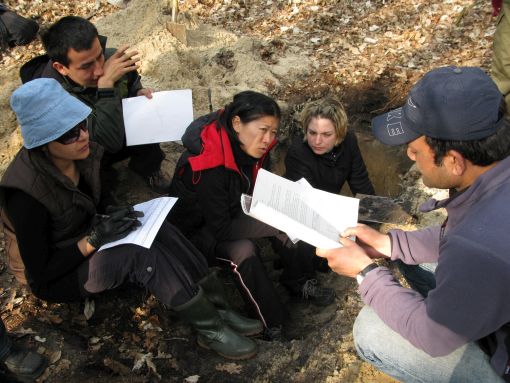Climate change, commercial interests, and the destructive use of land are threatening ecosystems worldwide, such as India’s biodiverse rainforests. Specialists in the “Landscape Ecology and Nature Conservation” (LENC) Master’s programme at the University of Greifswald are being trained to face just these kinds of problems.
The university has offered a German-speaking course of study in Landscape Ecology since 1996. Additionally, in 2007 it established an international English-language Master’s degree programme (LENC), which is now part of the development-related postgraduate courses programme. The students come from every part of the globe, and are primarily environmental scientists, biologists, ecologists, and geographers.
Starting with the 2014 winter semester, for the first time, seven DAAD scholarship holders will also be among them: “Along with the DAAD, we chose the scholars from among about 80 candidates,” says the programme’s coordinator Tiemo Timmermann. LENC fits in perfectly with the DAAD’s Development-Related Postgraduate Courses programme. “Developing countries face the greatest challenges in creating sustainable development and in protecting the environment. Our programmes produce change agents, who are able to make real changes in their countries, and worldwide.” The students bring working experience with them to Greifswald. After graduation, many return to their home countries, or go to other developing countries, and work primarily in non-governmental organisations (NGOs) or national environmental ministries.
Holistic and practical
Specialist know-how alone isn’t enough to protect the environment successfully in the long term. The University of Greifswald therefore follows a holistic approach that integrates scientific, hands-on technical, philosophical, economic and social aspects. The curriculum therefore covers a wide range topics – from analysis, assessment, and management of ecosystems/landscapes, to the ethical dimensions of climate and environmental protection, as well as knowledge about the structure of international organisations committed to environmental protection.
Graduates have shown that this multidimensional training is successful: “An Indian graduate wrote his Master’s thesis about how environmentally protected areas in India could be improved. As a result, he was able to convince those responsible in politics and administration, as well as local populations, and, with his own NGO, placed several large forests in his home country under protection,” says Tiemo Timmermann.
In the middle of nature
Last but not least, Greifswald offers these dedicated specialists the best environment in which to study landscape ecology: the university town, rich in tradition, is located on the Baltic Sea and is surrounded by large nature reserves. One doesn’t have to travel far to experience many different ecosystems and learn the practical skills needed to research, assess and conserve them. For international students, life in the town is ideal: “With about 50,000 residents and 12,000 students, the atmosphere in and around the university is very personal. Also, students are guided by mentors who are ready to assist with advice or practical help, so that no one falls through the cracks,” reports Tiemo Timmermann.
Viewing ecological problems holistically is not only preached at Greifswald, but also practiced: students as well as faculty, among them a LENC alumna from Nepal, are working together to make the university carbon-neutral by 2015.







